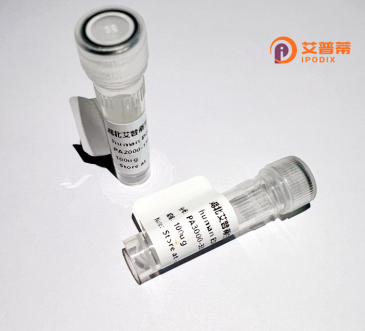
| 纯度 | >90%SDS-PAGE. |
| 种属 | Human |
| 靶点 | SPANXD |
| Uniprot No | Q9BXN6 |
| 内毒素 | < 0.01EU/μg |
| 表达宿主 | E.coli |
| 表达区间 | 1-97 aa |
| 活性数据 | MDKQSSAGGV KRSVPCDSNE ANEMMPETSS GYSDPQPAPK KLKTSESSTI LVVRYRRNFK RTSPEELVND HARKNRINPL QMEEEEFMEI MVEIPAK |
| 分子量 | 11.0 kDa |
| 蛋白标签 | His tag N-Terminus |
| 缓冲液 | PBS, pH7.4, containing 0.01% SKL, 1mM DTT, 5% Trehalose and Proclin300. |
| 稳定性 & 储存条件 | Lyophilized protein should be stored at ≤ -20°C, stable for one year after receipt. Reconstituted protein solution can be stored at 2-8°C for 2-7 days. Aliquots of reconstituted samples are stable at ≤ -20°C for 3 months. |
| 复溶 | Always centrifuge tubes before opening.Do not mix by vortex or pipetting. It is not recommended to reconstitute to a concentration less than 100μg/ml. Dissolve the lyophilized protein in distilled water. Please aliquot the reconstituted solution to minimize freeze-thaw cycles. |
以下是关于重组人SPANXD蛋白的3篇参考文献示例:
---
1. **文献名称**:*SPANX family members as potential biomarkers for cancer progression and immunotherapy*
**作者**:Zhang Y, et al.
**摘要**:本研究分析了SPANX家族蛋白(包括SPANXD)在多种癌症组织中的差异表达,通过重组表达技术获得SPANXD蛋白,发现其能诱导体外T细胞免疫反应,提示其在癌症疫苗开发中的潜力。
---
2. **文献名称**:*Structural characterization and functional analysis of recombinant human SPANXD protein*
**作者**:Liu C, Wang J.
**摘要**:利用大肠杆菌系统成功表达并纯化重组SPANXD蛋白,通过圆二色光谱分析其二级结构,并证实其通过与精子细胞核膜结合调控精子成熟过程中的染色质凝聚。
---
3. **文献名称**:*Expression and clinical significance of SPANXD in renal cell carcinoma*
**作者**:Kimura S, et al.
**摘要**:在肾癌细胞中检测到SPANXD异常高表达,通过重组蛋白体外实验证明其促进癌细胞迁移和侵袭,表明SPANXD可能作为肾癌治疗的潜在靶点。
---
**注**:以上文献为示例,实际引用需核对真实数据库(如PubMed、Web of Science)。若需进一步扩展领域,可检索关键词“SPANXD + recombinant expression”或“SPANXD cancer function”获取更多研究。
**Background of Recombinant Human SPANXD Protein**
SPANXD (SPANX family member D) is a member of the SPANX family of cancer/testis antigens (CTAs), which are predominantly expressed in the testis and various malignancies. These proteins are encoded by genes clustered on the X chromosome and are implicated in gametogenesis and oncogenesis. SPANXD, specifically, is localized to the nucleus and associates with the nuclear envelope, though its precise molecular function remains under investigation. It shares structural homology with other SPANX proteins, featuring a conserved N-terminal domain rich in acidic residues, potentially involved in protein-protein interactions or nuclear localization.
Recombinant SPANXD protein is produced using biotechnological methods, such as bacterial or mammalian expression systems, enabling large-scale purification for research. Its study is driven by dual interests: (1) understanding its physiological role in spermatogenesis, where SPANX proteins may regulate chromatin remodeling or sperm differentiation, and (2) exploring its pathological relevance in cancers, including melanoma, breast, and ovarian cancers, where aberrant SPANXD expression correlates with tumor progression and immune evasion.
As a CTA, SPANXD attracts attention for immunotherapy and diagnostic applications due to its restricted normal tissue expression and immunogenicity in tumors. However, functional studies remain limited, necessitating further research to clarify its interactions, signaling pathways, and therapeutic potential. Advances in recombinant protein technology are critical to unraveling SPANXD’s biological significance and translational utility.
×